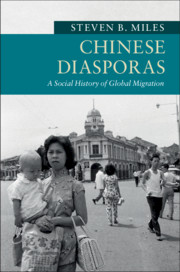Book contents
- Chinese Diasporas
- New Approaches to Asian History
- Chinese Diasporas
- Copyright page
- Dedication
- Contents
- Illustrations
- Acknowledgments
- Notes on Using This Book
- Introduction: Framing Chinese Migration
- 1 Early Modern Patterns, 1500–1740
- 2 Migration in the Prosperous Age, 1740–1840
- 3 The Age of Mass Migration, 1840–1937
- 4 The Chinese State and the Politics of Diaspora, 1860s–1940s
- 5 Disruptions and Diasporic Communities in the Mid-Twentieth Century
- 6 The “Floating Population” and “New Migrants,” 1980s to the Present
- 7 Transnational Chinese, 1990s to the Present
- 8 Is There a Chinese Diaspora?
- Index
- New Approaches to Asian History
- References
4 - The Chinese State and the Politics of Diaspora, 1860s–1940s
Published online by Cambridge University Press: 31 January 2020
- Chinese Diasporas
- New Approaches to Asian History
- Chinese Diasporas
- Copyright page
- Dedication
- Contents
- Illustrations
- Acknowledgments
- Notes on Using This Book
- Introduction: Framing Chinese Migration
- 1 Early Modern Patterns, 1500–1740
- 2 Migration in the Prosperous Age, 1740–1840
- 3 The Age of Mass Migration, 1840–1937
- 4 The Chinese State and the Politics of Diaspora, 1860s–1940s
- 5 Disruptions and Diasporic Communities in the Mid-Twentieth Century
- 6 The “Floating Population” and “New Migrants,” 1980s to the Present
- 7 Transnational Chinese, 1990s to the Present
- 8 Is There a Chinese Diaspora?
- Index
- New Approaches to Asian History
- References
Summary
Chapter 4 examines the politicization of diaspora, that is, the ways in which successive Chinese states made claim upon Chinese overseas, seeking to mobilize overseas Chinese for the cause of the Chinese nation. Concomitant with these efforts was the emergence of a concept of the overseas Chinese, or the Chinese diaspora, as a coherent, ideally unified population. The chapter traces the role of Chinese reformers, revolutionaries, and students in politicizing Chinese in diaspora. It also shows how Chinese states sought to coopt or create such diasporic institutions as native-place associations, schools, and chambers of commerce. The chapter asserts that World War II, known to Chinese as the War of Resistance against Japan, was an important “diasporic moment” in which overseas Chinese channeled resources for the nation. The chapter culminates by introducing the work of the early twentieth-century Chinese sociologist Chen Da, showing how his study of emigrant communities in China sought to answer the question of how Chinese migration affected the Chinese nation.
Keywords
- Type
- Chapter
- Information
- Chinese DiasporasA Social History of Global Migration, pp. 136 - 167Publisher: Cambridge University PressPrint publication year: 2020

